🧠 Why Thinking of Yourself as an "Adult-Onset Swimmer" Is a Massively Limiting Mindset
This limiting mindset isn’t exclusive to amateur swimmers—professional triathletes like Sam Long, Lionel Sanders and Joe Skipper fall into the same trap too.
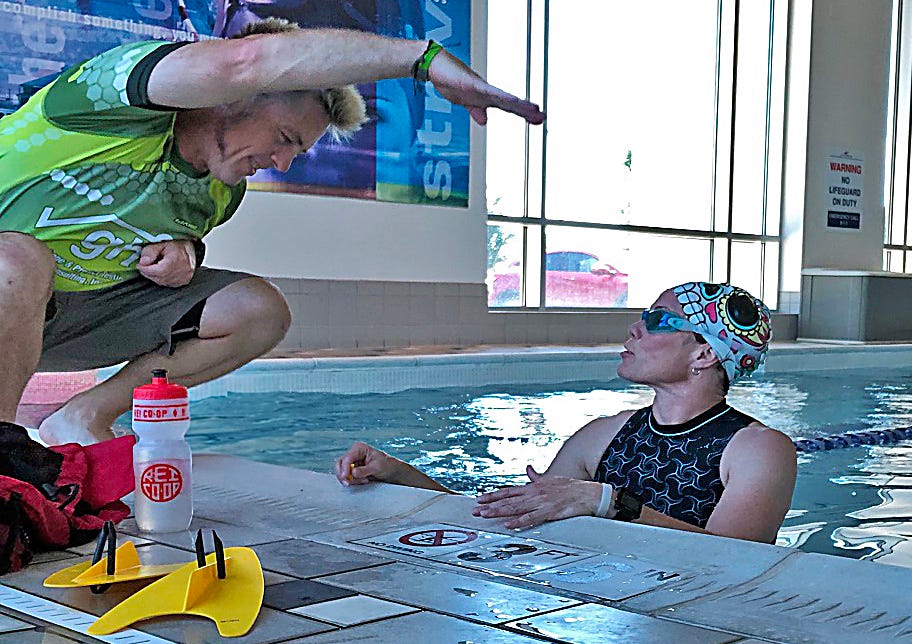
Hey team,
You might want to consider listening to today’s blog using the link above as it contains some really interesting insight from a conversation I had last week with an adult swimmer seeking desperately to improve her swim.
Is This You?
For many swimmers who learn to swim later in life, the term "adult-onset swimmer" becomes a part of their identity.
Maybe you even think of yourself in this way?
People often use it to explain perceived limitations or frustrations in the water, such as slower progress or a lack of natural feel.
But what if that label is more of a mental block than an actual disadvantage?
A recent conversation with Rachel, a 1-to-1 swimmer I worked with last week highlighted this very issue, showing how clinging to this mindset can hinder progress and limit potential.
Breaking Down the Limiting Belief
Rachel, like many adult learners, has faced numerous challenges in her swimming journey. Despite seeking expert guidance in multiple countries, she found herself disappointed, feeling that she had not made the progress she hoped for. Her frustration was palpable as she shared,
"I just want to get better so bad. I realize I'm at a huge disadvantage because I didn't have proper swim lessons as a child. So, you know, I joke that I'm essentially an adult-onset swimmer."
This narrative had become a way of framing her entire swimming experience, a way to justify the struggles and the slow pace of improvement.
Yet, while Rachel’s frustrations are understandable, the real challenge lies not in her age or how she came to swimming but in the power she gives to this label. By thinking of herself as an “adult-onset swimmer,” Rachel had subconsciously set limits on what she believed she could achieve in the pool. It became a lens through which she viewed every stroke, every correction, and every setback.
Consider this: when have you ever heard someone describe themselves as an "adult-onset golfer," cyclist, runner, or yogi? You haven’t. People doing these sports just take them for what they are - a new challenge. Yet, this label pervades within the adult swimming community—and like a bad smell, it’s not the best way to frame your experience.
How the Adult-Onset Label Holds You Back
Identifying as an "adult-onset swimmer" can become a self-fulfilling prophecy. It’s easy to fall into a pattern where every technical struggle or perceived shortcoming is attributed to this label. When you frame yourself as fundamentally different from those who learned to swim as children, you risk reinforcing a mindset that says,
“This is as good as I can get.”
The truth is, learning to swim as an adult does present unique challenges. But many of these are rooted in the mental game rather than physical capability. Rachel’s experience isn’t unique—she described moments where she felt everything come together beautifully, with her body connected in the water, only to lose that sensation moments later,
"I get it for like, two seconds, and then I'm back feeling like I’ve lost it all again"
she said, capturing a frustration many adult swimmers know well.
We See this Issue with the PROs too!
This limiting mindset isn’t exclusive to amateur swimmers—professional triathletes like Sam Long, Lionel Sanders and Joe Skipper all fall into the same trap. Despite being elite triathletes, they often joke about their poor swimming ability on social media, often blaming it on not swimming as kids. These comments mask a deeper reluctance to fully engage in the work needed to improve.
For example, at the recent t100 in Las Vegas, Sam exited the water 6 minutes behind the pro field. About 18 months ago Sam asked me to review his swimming technique and program. This comes after hundreds of messages and social media posts from people worldwide, reaching out to me, eager to see Sam succeed and asking for my support. I spent an entire weekend doing a free analysis and writing a program for him, only for Sam to dismiss it, saying he didn’t fully agree with my points on his breathing and the type of systemised training he needed to be applying consistently. Fair enough I guess - each to their own, but please, do something different, Sam.
Similarly, Joe Skipper made great progress with us in Perth in 2018/19, but has sadly since regressed - on the brink of retiring even - once again viewing himself as a swim-hater in his social media posts, which is a real shame. His mindset, like Sam’s, has become a self-fulfilling prophecy, but it needn’t be that way.
Lionel Sanders too has been threatening for many years to come and spend a summer over here with us developing his swimming, but has never committed to taking that action. Lionel finished 32nd on Saturday at the 2024 Vinfast Ironman World Championships in Kona, Hawaii after exiting the water over 5 minutes behind Patrick Lange, the overall winner.
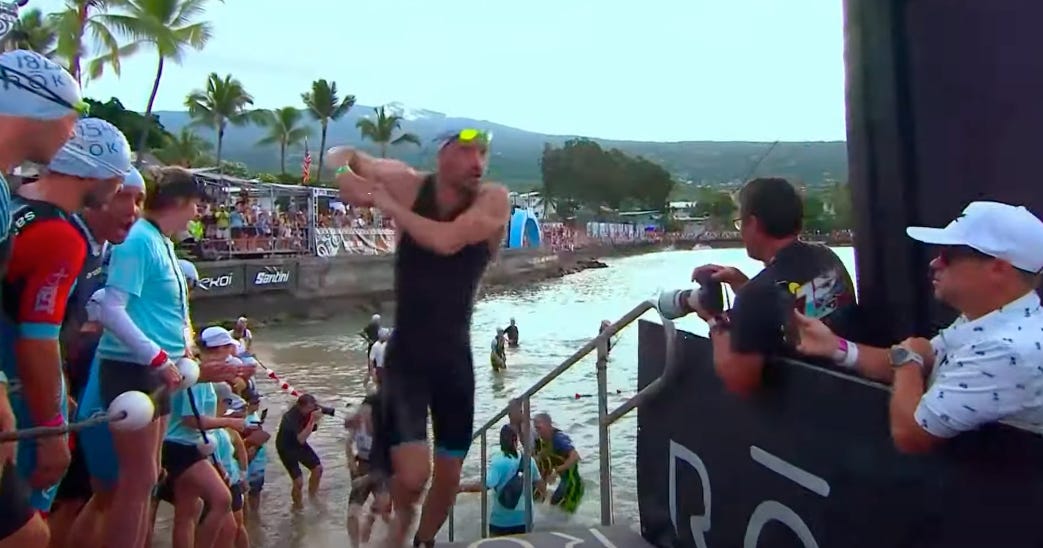
What’s notable about Patrick’s performance is that he is also not normally known for his swimming prowess, but with such a brilliant swim, he laid the foundations for his third title at a spritely 38 years of age. Chapeau! Patrick’s new coach, Ben Reszel, is also noted for his logical, scientific approach and had dedicated serious time to helping Patrick with his swimming. His one-line philosophy mantra says it all,
”Outside your comfort zone your goals become reality!”
Lange's press release, just five days before the big event, reflected the immense time and dedication he had invested in his swimming, along with the resolve to overcome past challenges—including a previous panic attack during the swim in Frankfurt. The article by 220 Triathlon is well worth a read1.
”So, yes, the swim is super important, especially if it happens to be a windy day in Kona. To be more specific still, it is the moments following the cannon firing on the pier that can make the difference. I normally don’t drop out of [swim] groups, but my weakness is the takeout speed and first 400m. It’s a big area of focus for me and one of the most important topics I want to get right in Kona.”
So, clearly, all of these pros have the physical potential and resources to improve, but sometimes their reluctance to shed the “adult-onset swimmer” identity holds them back. Joking about poor performances distracts from the real work needed to close the gap. As professionals, they need to take their swim training as seriously as the rest of their disciplines, just like Patrick did in Kona, rather than letting a limiting belief define them.
For what it’s worth, I’d still gladly help all of these athletes shed this mindset and finally move their swimming forwards.
A New Approach: Focus on Logic, Not Labels
The key to Rachel’s breakthrough—and to overcoming this mindset that many share—is a shift in focus. By putting aside the label of "adult-onset swimmer" and instead concentrating on the tangible, physical aspects of her stroke, Rachel could finally start seeing the improvement she sought. This is where a logical approach to swimming, grounded in the physics of movement, becomes essential:
As I explained to her during our session, it's about understanding the science behind the stroke. A critical element we tackled was the hand entry into the water. This entry sets up the rest of the stroke for success—creating a better catch, establishing a smooth press through the water, and positioning the body to maintain momentum. A proper hand entry helps lift the hips and reduces the need for a forceful kick, allowing for a more efficient, streamlined swim.
The drills and techniques we used in the pool focused on making these adjustments feel instinctive. Using a radio headset for real-time feedback, I guided Rachel through the motions, helping her understand how each subtle change improved her overall efficiency. I told her,
"Trust me, it's literally been my life's work to try to dispel some of the myths you've encountered. Let's focus on the logical changes we can make right now."
The Power of Erasing the “Adult-Onset” Label
The real turning point came when I challenged Rachel to let go of the "adult-onset" label.
"I want you to erase the vernacular of being an adult-onset swimmer. It’s bullshit (pardon my French!). It's become a limiting self-belief. I’m not saying you didn’t start swimming as an adult, just that it’s too easy to then say ‘that’s why I find it hard’ rather than focusing on the logical steps required to improve it."
By clinging to this identity, she was reinforcing a narrative that kept her from embracing the improvements she was capable of achieving. Once that mindset is removed, it opens the door to a fresh perspective: one where each stroke correction is an opportunity for growth, rather than a reminder of past struggles.
Thinking of yourself as an "adult-onset swimmer" is tempting—it gives a name to the frustrations you feel. But in reality, it can become a crutch, holding you back from reaching your full potential. The progress Rachel made during our session came not from suddenly transforming her swimming background but from focusing on the here and now. She discovered that by concentrating on the practical adjustments—like her hand entry and body position—she could swim better, faster, and with greater ease.
Embrace the Present, Not the Past
If you see yourself as an adult-onset swimmer, it’s time to challenge that mindset. Consider this: what if your journey to better swimming isn't constrained by when you started but by how willing you are to adapt, learn, and evolve? Let go of the idea that your progress is inherently limited because you didn't learn as a child. Instead, embrace the logic of technique improvement, the joy of refining your stroke, and the possibility of achieving more than you ever thought possible.
Rachel’s story serves as a powerful reminder that our swimming journey is what we make of it, and she’s already coming on leaps and bounds with this exciting update less than a week after our session:
”Hi Paul. Recovery swim went awesome today! I averaged a 2:11 pace where before I was swimming 2:18-2:20 for recovery!”
So, remember, the true disadvantage isn't starting as an adult; it's letting that starting point define the rest of your path. Focus on what you can change today, and you might just find that the water feels a lot more welcoming—and your potential a lot more limitless, just like Rachel’s.
Get Help Today!
If you’ve read the article and think you like our approach to coaching, please consider registering for a session with one of our Certified Swim Smooth Coaches - all of whom preach from this same ‘hymn sheet’!
On that note, we’re thrilled to welcome Perry Hock to the Swim Smooth Coaching team! Perry brings a wealth of experience, from his background in triathlon and Ironman racing to his expertise as a US Masters certified Adult Learn-to-Swim instructor. Having personally experienced the challenges of overcoming outdated swim techniques, Perry knows firsthand how powerful a tailored approach can be in transforming a swimmer’s journey. He’s passionate about providing individual attention through private coaching, helping swimmers of all levels unlock their potential, refine their technique, and build confidence in the water.
Welcome, Perry, and thank you for joining our mission to help adults discover the joy of swimming!



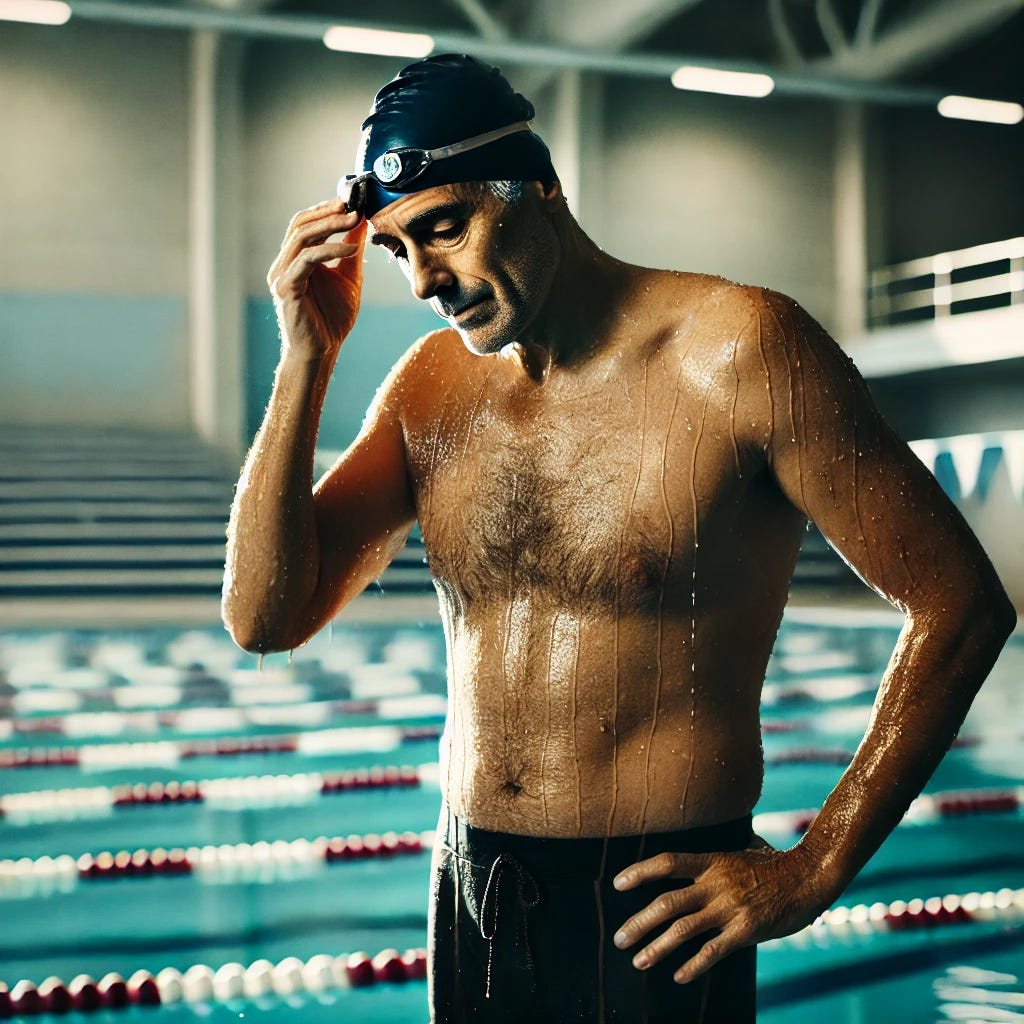

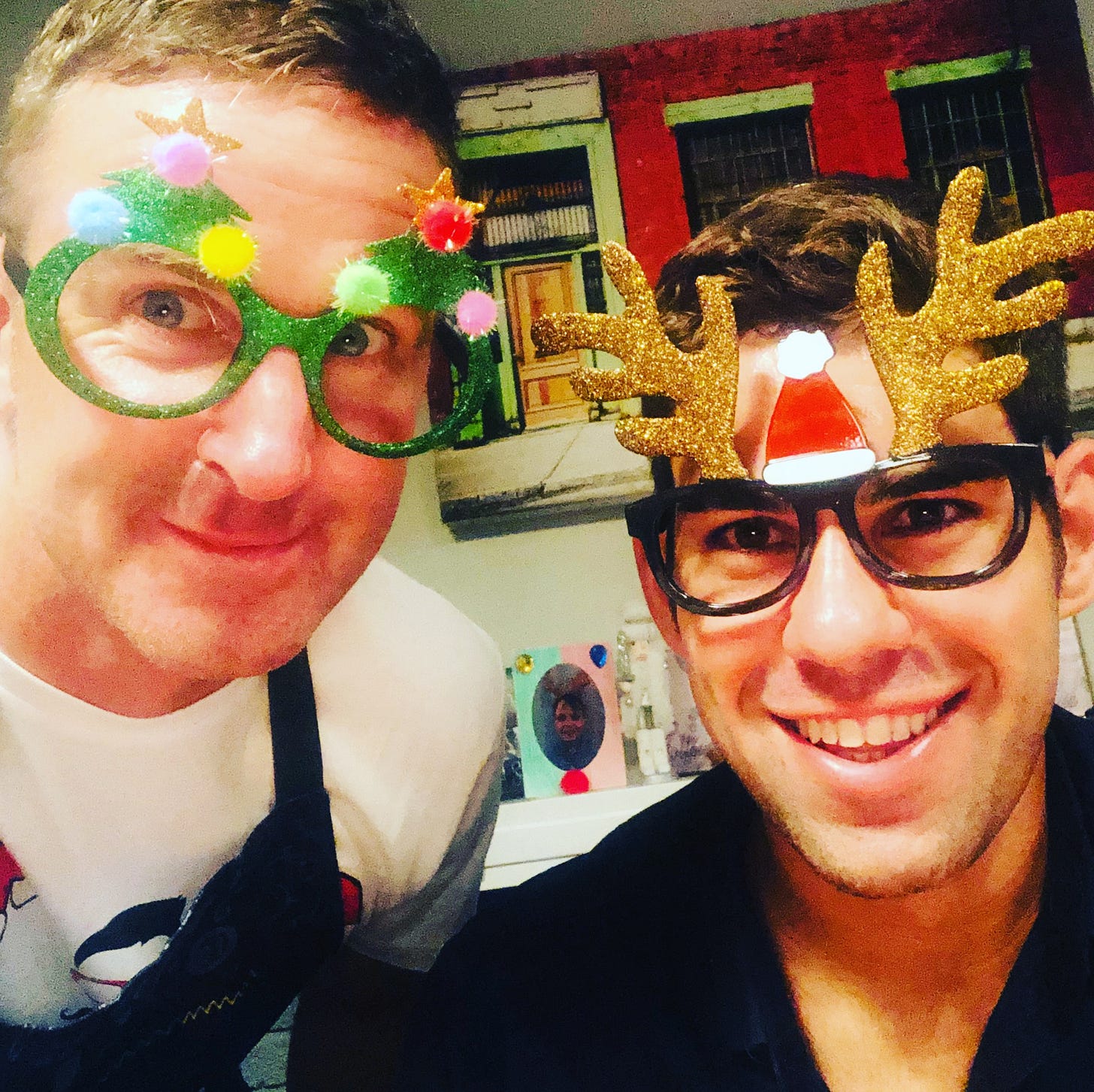
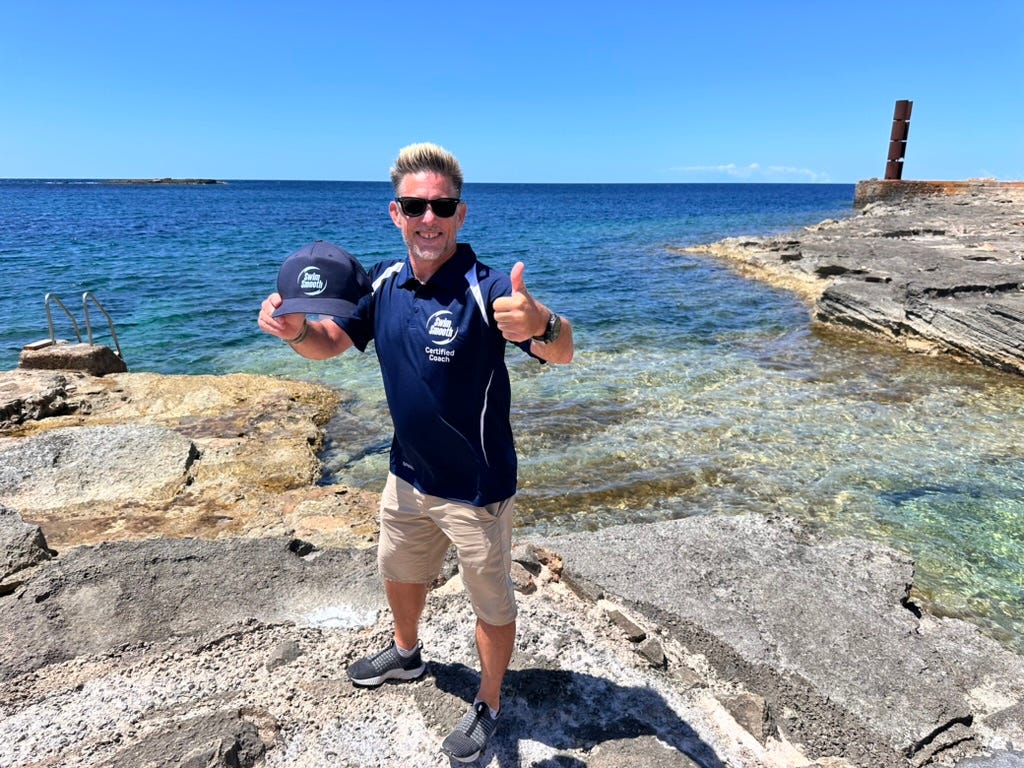
I absolutely loved reading this post Paul and can relate so much to the limiting label we put on ourselves. I have been riddled with swimming injuries over the years which have kept me out of the water time and again. I’ve had two 1:1 video sessions with you over the past 9 months which have completely changed my swimming technique for the better and I’ve experienced fantastic improvements. Until reading this post, I don’t think I’d reflected on the fact that I still am hanging on to the label I’ve given myself of being an “injured swimmer.” I think this fear of the anticipated “next injury” is holding me back versus just making good training choices and continuing to develop and practice my technique, which will both naturally reduce my injury risk. It’s just that flip of my mindset to what is productive instead of obstructive!
I can relate to so much of what Rachel says, particularly the amount of help she's sought and the sheer desperation to be better. What's really changed my mindset about swimming is doing a video analysis and swim coaching with Lucy Lloyd-Roach. In just a couple of sessions Lucy has given me belief that I can improve - all I've ever needed is someone to give me clear, simple help and guidance. I know I still have a long way to go but I'm so happy to be seeing progress.